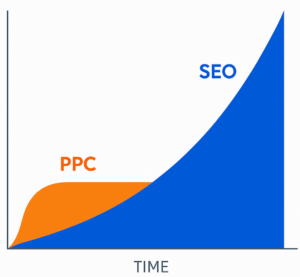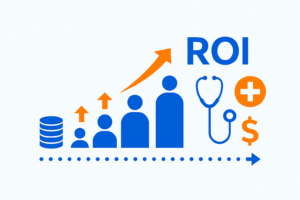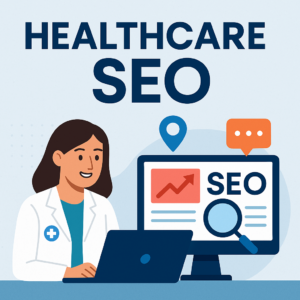Healthcare SEO Explained: Simple Answers to Your Big Questions
If you’re a doctor, practice manager, or someone trying to grow a healthcare clinic, you’ve probably heard the term “SEO” tossed around more than a few times. And sure, it sounds important but what does it actually mean, and how does it help your practice grow? Is it really worth the effort?
This guide breaks it all down in plain English, no jargon or fluff. Just real answers to real questions, so you can understand what SEO does, how it works, and whether it’s the missing piece in your marketing strategy.
Let’s dive in and get to learning.
1. What exactly is SEO, and why should my clinic care about it?
First off. SEO stands for “search engine optimization“. Think of Google, Bing, Yahoo, heck: even YouTube is a search engine. Our job is to optimize your rankings on these platforms. That’s the simple version of it. By improving your SEO, you help your clinic show up when potential patients search online for the services you offer. It drives visibility, traffic, and trust without relying on ads. SEO will compound over time. So the longer you do it, the better it performs.
2. How long does it take to see results from SEO?
Most clinics will start to see early traction in 3–6 months, with stronger results coming in around the 6–12 month mark. It’s a long game, but one with lasting payoff. This is not a service of instant gratification. SEO take good quality work over a long period of time. This is why many agencies require a 12 month agreement.
3. What’s included in a healthcare SEO strategy?
A bunch of things!! Google factors many things into their rankings system. Think: keyword research/rankings, local listings, website optimizations, backlinks, and ongoing content. There are many more things like site speed, core web vitals, mobile optimization, engagement rate and more. But the first few, are the ones that really drive the needle in the right direction. So we want to make sure we hit it all, but we prioritize things to your specific needs based on where you’re starting at now.
4. What’s the difference between Local SEO and Organic SEO?
Local SEO is just how the name sounds. It’s a localized approach that helps you show up in map results (“near me” or “city based” searches). This has a lot to do with your Google Business Profile rankings and keywords from the website. While Organic SEO helps your website rank in the regular search listings for some of your more broader keywords. While they are different in many ways, they’re also both needed for a great campaign and great results.
5. How important is my Google Business Profile for SEO?
Think of this like your digital storefront. People get to see pictures, read honest reviews and feedback, find your hours, location and contact information all in one spot. An optimized Google profile can drive calls, clicks, and reviews. All of which boost your online rankings and build patient trust.
6. Do I really need blog posts on my site?
Yes, yes, and one more yes for good measure. There’s a saying the marketing world that “content is king” and it’s absolutely true. Content is what builds trust, answers your patients, questions, ranks you higher on Google and keep your audience engaged on your website. That’s where we focus on specific keywords and show Google that we are actively updating our site with fresh and helpful content. Blogs are a crucial part of any good SEO rankings.
7. How does SEO compare to Google Ads or other paid strategies?
Ads deliver fast results—but stop the moment you stop paying. SEO takes longer, but builds a steady flow of cost effective and qualified traffic over time.
The best analogy I’ve heard for this comparison is the vegetable party tray. You’re going to a party and you’re in charge of bringing a vegetable platter. If you go to the store and purchase one, it may cost you $15-$20 bucks, but it’s all ready for you. The vegetables have been grown, picked, washed, cut and placed on a nice and neat platter. Sure it may cost more, but you have it when you need it (this is Google Ads). However, if you have your own garden in the back yard, you can go out there and pick your own vegetables and make your own platter. The cost is more manageable and you get more yield from a garden, but you’re trading time vs money. This is SEO. It may take longer, but it’s much more cost effective and produces more results.

8. What keywords should my clinic be targeting?
Well first, you need to start with your own business name. After that, you’ll want to focus on services, conditions, symptoms, and locations that match how patients search like “family doctor in [city]” or “knee pain treatment options”. Anything that would be relevant to your business is a keyword we have the opportunity to rank for. The possibilities are endless.
Not all keywords are created equal though. Some have higher search volume and typically come with higher competition. Those will take time to rank. Others will be the complete opposite. Finding that right balance is the key behind any good keyword strategy development.
9. How do I know if my current SEO is working?
There are dozens of vanity key metrics to report on with SEO. But at the end of the day we really only care about the increase of patients walking through your doors. However, we should be able to see that growth with an increase in keyword rankings, website traffic, leads forms or phone calls, and many other sources. SEO isn’t always a month-to-month comparison. Valleys happen with new algorithm updates or website changes. But quarter over quarter, you should see the upward trend.
10. Is SEO safe for healthcare websites with HIPAA rules?
Yes. SEO never tracks the names or personal information of individual patients. That’s all done with a HIPPA compliant CRM tool. We just track the total number of visitors or leads you get each month. Good SEO doesn’t involve handling sensitive information, and it should always respect privacy and compliance standards.
11. Why aren’t we ranking higher even though we have a website?
The movie field of dreams lied. Just because you built it doesn’t mean they will come. Having a website isn’t enough. Rankings depend on site structure, speed, content quality, backlinks, keywords positions and dozens of other factors. Building a website is the first step, but SEO it is where the growth really happens.
12. Can I do SEO myself or do I really need a specialist?
You can absolutely do some of it yourself. You can start with the basics like claiming your Google Business Profile and generating reviews. Or start by writing your own blogs and content to your website.
But for true results, you’ll want someone who lives and breathes healthcare SEO. Onsite technical optimizations have a learning curve but can be done with enough skill and know how. However, backlinks are very hard for the average person to do correctly. This is why it’s usually best to let the experts handle all aspects of your SEO while you focus on taking great care of your patients.
13. What kind of ROI should we expect from SEO?
That’s the million dollar question isn’t it?
Predicting exact ROI with SEO is tough. Because the longer your campaign runs, the stronger the results tend to get. Plus, we can’t exactly predict the future. Instead, let’s focus on what really matters: getting more leads through your door and sending more happy patients back out. How much is one new patient worth to your practice? What about a patient who books multiple visits, or refers their friends and family? That’s the real beauty of SEO—the returns can be endless when patients keep finding you online.

Ready to Put Your Healthcare SEO Strategy to Work?
SEO might feel like one of those “mystery” marketing tactics, but it doesn’t have to be. Once you understand the basics (and partner with someone who knows what they’re doing), it can be one of the most powerful ways to consistently attract new patients without paying for every click.
If this FAQ sparked a few lightbulbs or confirmed what you’ve been wondering, let’s talk. We help healthcare clinics build strong, sustainable SEO strategies without the cookie-cutter approach.

